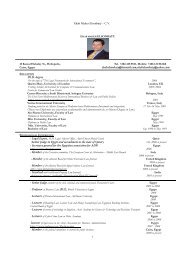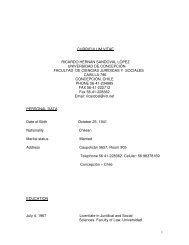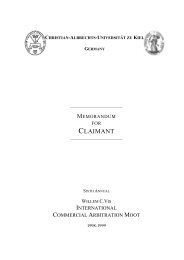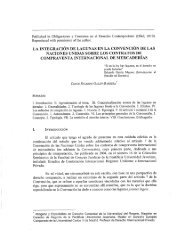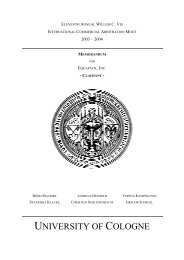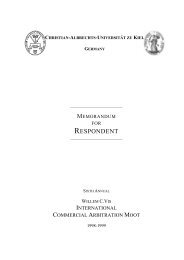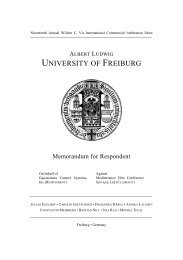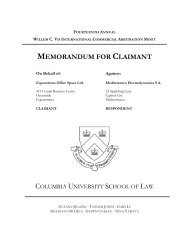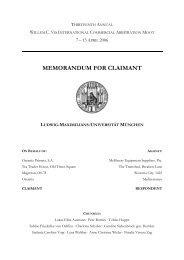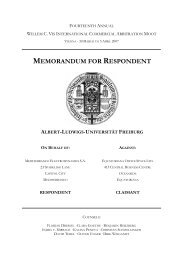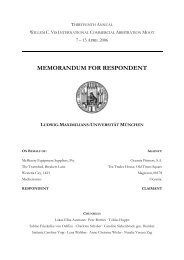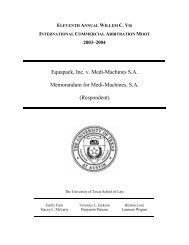MEMORANDUM FOR RESPONDENT - Pace University
MEMORANDUM FOR RESPONDENT - Pace University
MEMORANDUM FOR RESPONDENT - Pace University
Create successful ePaper yourself
Turn your PDF publications into a flip-book with our unique Google optimized e-Paper software.
QUEEN’S UNIVERSITY FACULTY OF LAW<br />
1. Claimant divulged the existence of arbitration and the content and subject<br />
matter of the dispute.<br />
34. Even if Claimant had merely divulged the existence of this arbitration, that alone would have<br />
constituted a breach of art. 8(1) 2010 Milan Rules, which restrict disclosure not only of the<br />
“award”, but also of the “proceedings”. This language was adopted to give an expansive scope to<br />
the duty of confidentiality [Coppo in Finkelstein 28]. In international arbitrations, “the mere fact<br />
that an arbitration is pending may be viewed as a secret” [Noussia 129; Hassneh Insurance v. Mew<br />
(UK 1993) 247]. For example, in Aita v. Ojjeh, the Paris Court of Appeal found that Aita<br />
challenged the arbitration in a court that it knew lacked jurisdiction for the sole purpose of<br />
publicizing the dispute [(France 1986)]. The Court found Aita breached confidentiality by causing<br />
“a public debate of facts which should remain confidential” [Paulsson/Rawding 312; Noussia 121].<br />
Here, Mr. Schwitz told Commerical Fishing Today that it had “started arbitration proceedings”<br />
against Respondent [Resp. Ex. 1]; this disclosure on its own constituted a breach of art. 8(1).<br />
35. However, Claimant not only disclosed the existence of the arbitration, but also revealed its<br />
subject matter and allegations made in the Request for Arbitration [Resp. Ex. 1]. Art. 8(1)<br />
stipulates that parties must keep the proceedings confidential, which Claimant violated in its<br />
interview with Commercial Fishing Today. The Paris Commercial Court held that a party<br />
breached confidentiality when it released a statement divulging the existence of the dispute, the<br />
existence of the arbitration, and the amount of the claim [True North v. Bleustein (France 1999) cited<br />
in Poudret/Besson 316-317]. Claimant’s disclosure mirrors that in True North: it divulged the<br />
existence of the dispute, the existence of the arbitration and facts and arguments pertaining to<br />
the merits of the dispute. Mr. Schwitz stated that Respondent had supplied “completely<br />
inappropriate” squid to Claimant and “they knew it” [Resp. Ex. 1].<br />
2. There is no applicable exception to the duty of confidentiality that would<br />
have permitted Claimant’s disclosure.<br />
36. Claimant may argue that its breach of confidentiality was permissible. Art. 8(1) 2010 Milan Rules<br />
provides that a party may breach confidentiality to the extent required to protect its rights. This<br />
provision protects legal rights, such as “the right to enforce or challenge the award”, but does<br />
not extend to commercial rights [Coppo in Finkelstein 28-29]. Any disclosure must be “reasonably<br />
necessary” to establish the party’s legal rights against a third party [Noussia 31, 110; Insurance v.<br />
Lloyd’s Syndicate (UK 1995); Ali Shipping v. Shipyard (UK 1998)]. Art. 8(1) also permits breaches of<br />
confidentiality where parties have a legal duty to disclose [Coppo in Finkelstein 29; Noussia 29].<br />
However, Claimant did not owe any legal duty to disclose this arbitration, nor was Claimant<br />
enforcing or protecting a legal right [Clar. 15].<br />
12



